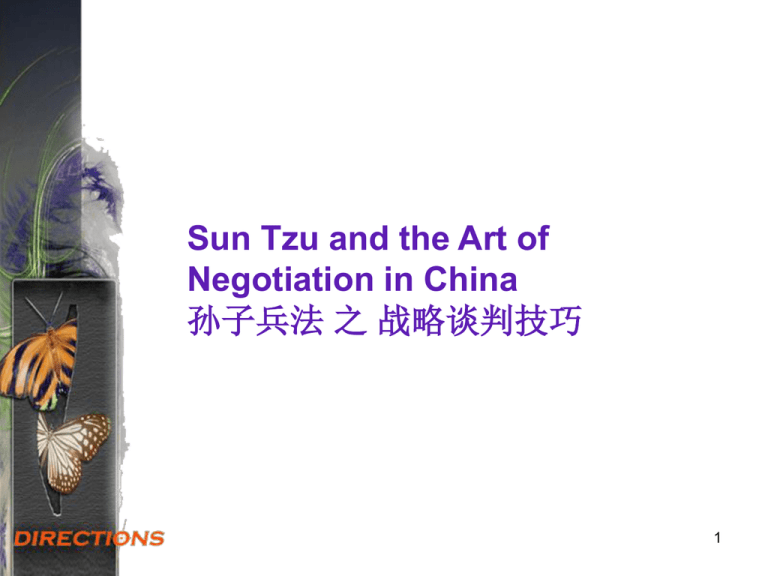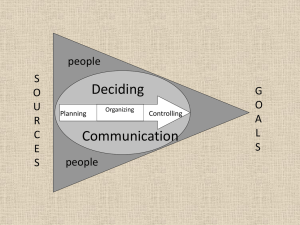Elements of Sun Tzu and the Art of Negotiation 孙子兵法之战略谈判
advertisement

Sun Tzu and the Art of Negotiation in China 孙子兵法 之 战略谈判技巧 1 What are some of the Biggest Challenges in your Negotiations in China? 你在谈判中遇到困哪些主要惑? 2 Elements of Sun Tzu and the Art of Negotiation 孙子兵法之战略谈判纲要 • Why Plan? 为何计划? • Know Yourself and Your Adversary 知己知彼 • Building Trust in Negotiations 相 互建立信任 • Finding Out Your Adversaries’ Needs and Concerns 找寻对手的需 求与顾虑 • Presenting Your Demands 向 对方提出要求 3 Elements of Sun Tzu and the Art of Negotiation 孙子兵法之战略谈判纲要 • Why Plan? 为何计划? 4 胜兵先胜而后求战, 败兵先战而后求胜 The victorious army plans for victory before fighting, the vanquished army fights before planning for victory 5 Why Plan? 为什么要作计划? • “In preparing for battle, I have found plans are useless, but planning indispensable.” “在打仗前的准备阶 段,我发现计划没什么作用,但又是不可 缺少的。” Dwight D. Eisenhower 埃森豪威尔 (1890–1969), U.S. general, Republican, politician, president. 美国总统、政治家、共和党、将军 6 谈判 与 协商有什么区别? 7 Negotiation 谈判是: Get Others to Give You What You Want, by Giving Them What They Want 给对方他们想要的东西来换取我们想要的东西 8 Formulating Your Negotiating Strategy 拟定你的谈判战略 • 道:Your Goal 谈判目标 • 天:External Factors beyond Your Control 在你掌控以外的外在因素 • 地:External Factors within Your Influence 在你影响范围内的外在 因素 • 将:The People Conducting Your Negotiation 执行谈判的“良将” • 法:How Should the Negotiation be Conducted 如何实施谈判 9 Rules of Sales Negotiation 商的规则 销售协 • You have the right to say “No”. If you can't say “No”, you are in big trouble 你 有权说“不”。如果觉得不能说“不”, 你就麻烦大了 • Your job is not to be liked, it’s to be respected 你的工作不是要被他人所喜欢, 而是要受到对方的尊重 • Price is as psychological as it is emotional, but NEVER, ever rational 价 格的决定可以是感性的,也可以是心理的, 但从来不是理性的 19 Rules of Sales Negotiation 商的规则 销售协 • “Loose lips sink ships” “祸从口出” • Always enter every negotiation with an agenda — what’s your desired outcome and how you want to achieve it 永远在每 一次谈判之前都都得将谈判流程计划好- 你的预期结果及如何达到 • The only goals are those you can control: behavior and activity 目标应该是 那些你能够控制到的:行为和行动 20 Rules of Sales Negotiation 商的规则 销售协 • Always think in the customers’ positions, and highlight their “pain” 永远从客户的角 度思考,在他们的“痛处”上做工作 • Do you know ALL the decision influencers? 你是否已经认识所有影响决 定的人士了吗? • “No” is good, “Yes” is good, “Maybe” will kill you “不”是好的,“是”是好的, “可能”会让你痛不欲生 21 Managing Your BATNA (Best Alternative to a Negotiated Outcome)处理你的BATNA (未取得谈判结果的应对方案) • Your ideal outcome 你理想的结果 • Your bottom line 你的底线 • Your bargaining conditions 你的讨价还价 的筹码 • Possible alternatives 可供考虑的备用方 案 • When to say “no” 什么时候说“不” • How to say “no” 如何说“不” 22 凡战者,以正合,以奇胜 In war, use conventional methods to get your army organised, but use unconventional methods to achieve victory 24 Elements of Sun Tzu and the Art of Negotiation 孙子兵法之战略谈判纲要 • Why Plan? 为何计划? • Know Yourself and Your Adversary 知己知彼 25 改变中的环境 The Changing Environment • 你的行业现在跟五年前相比有什么 区别? What are the differences in your industry now compared to 5 years ago? • 你的行业五年后跟现在对比又将有 什么区别? What will be some of the differences in your industry 5 years from now? 26 The Motivations Behind Each Player 每个角色的购买动机 • Buying to Spur Growth 刺激增长 • Buying to Solve a Big, Current Problem 解决棘手的问题 • So-So, Not Much Motivation to Buy 不 好不坏,对你的产品可有可无 • Over Confident, No Reason to Buy at All 过于自信,完全没有购买的必要 In ALL Big Selling, there’s ALWAYS official and personal motivations for each player 所有购买角色都有在公、在私的动机 27 What are some of the buying motives of your typical adversary? 你们一般的对手又有哪些购买动机 呢? 30 不知敌之情者,不仁之至也,非民之 将也,非主之佐也,非胜之主也 If you don't know much about your adversary, you won't command victory 31 Elements of Sun Tzu and the Art of Negotiation 孙子兵法之战略谈判纲要 • Why Plan? 为何计划? • Know Yourself and Your Adversary 知己知彼 • Building Trust in Negotiations 相 互建立信任 32 水之行避高而趋下,兵之形避实 而击虚 Choosing the message with the least resistance 33 是故百战百胜,非善之善也;不战而 屈人之兵,善之善者也 The best victory is the one that is won without fighting 34 Why Listening? 为何聆听? 35 不知敌之情者,不仁之至也,非民之 将也,非主之佐也,非胜之主也 If you don't know much about your adversary, you won't command victory 36 Why do we need trust in negotiations? 我们在谈判时为什么需要建立信任? 37 Ways to Build Trust 建立信任的方式 • Use their lingo 使用对方的用语 • Take time to learn about their needs and culture 花时间了解对方的需求 及文化 • Listen 聆听 • Be factual 就事论事 • Be fair 处事公平 • Seek to optimise mutual benefit 尽 力优化双赢结果 38 Elements of Sun Tzu and the Art of Negotiation 孙子兵法之战略谈判纲要 • Why Plan? 为何计划? • Know Yourself and Your Adversary 知己知彼 • Building Trust in Negotiations 相 互建立信任 • Finding Out Your Adversaries’ Needs and Concerns 找寻对手的需 求与顾虑 39 为什么你挖掘对手的需求与“痛 处”? Why do You Need to Uncover the Needs and “Pains” of your Adversaries? 40 怎样作首次接触沟通 What to Say on first Contact? 不管你说什么,都得带给客户合适 商务价值! Whatever it is, it MUST be Valid Business Reason to the customer! 41 合适商务理由 Valid Business Reason • 在会面的开始时,我们先与对方陈述此次会面的 合适商务理由(当客户了解你提问的用意,他更 会与你合作) State your Valid Business Reason for your Meeting, and Get Permission to Ask Questions – “…今天我跟您交谈的目的是想了解我们能不能为你们 提供更好的过滤方案以提高您的产品质量。你不介意 我问一些问题,了解一下您的情况?…” “…The purpose of my meeting is to explore better filteration solutions to improve product quality. Is it OK that I ask you a few questions?...” 42 Uncovering the Needs and “Pains” of Customers 挖掘客户的需求与“痛 处” • First, state your Valid Business Reason 首先,陈 述你的合适商务理由 • Then, ask the following types of questions 接 着提问以下: – Current-Future States 当下与预期的状况 – Highlighting and Intensifying “Pain” Areas 挖 掘客户的 “痛楚” – Expected Paybacks/ ROI 对方所预期的回报 – Associated Risks and Obstacles 相关的风 险与障碍 – Provide Assurance 安抚他们的忧虑 43 Uncovering the Needs and “Pains” of Customers 挖掘客户的需求与“痛处” • Current-Future States 目前与预期的状 况 • Highlighting and Intensifying “Pain” Areas 突显与加重客户的“痛楚” • Expected Paybacks/ ROI 对方意向的回 报 Then 然后…… • Present your demands 提出你的要求 48 Elements of Sun Tzu and the Art of Negotiation 孙子兵法之战略谈判纲要 • Why Plan? 为何计划? • Know Yourself and Your Adversary 知己知彼 • Building Trust in Negotiations 相 互建立信任 • Finding Out Your Adversaries’ Needs and Concerns 找寻对手的需 求与顾虑 • Presenting Your Demands 向 对方提出要求 52 Presenting Your Demands 提出你的要求 • Start with how you are focused on mutual goals 先以双方的沟通目标作为开头 • State your demand 提出你的要求 • Tell them what you will be willing to concede in return for your demands 向对方提出你为了达到 你的要求而愿意作出的让步 • For Every Demand, Ask a Confirmation Question to Get Client’s Agreement 在提出 每个要求的时候,提出一个确认式的提问,博取 客户的认同 54 Example: Presenting Your Demands 举例:提出你的要求 • Start with how you are focused on mutual goals 先以双方的沟通目标作为开头: – “…What we would like to achieve here today is to seek an agreement for mutual benefit…” “…我们今天会南面的目的 就是想找到双赢的共识…” • State your demand 提出你的要求 – “…What we need from you is your committment to…” 我们需要贵公司作出以下承诺…” “… • Tell them what you will be willing to concede in return for your demands 向对方提出你为了达到 你的要求而愿意作出的让步 – “…In return, here's what I can do for you…” 愿意给你们以下承诺…” • Getting Confirmation “…而我方将 博取认同: – “…Is this one way that will help us achieve mutual 55 agreement...” “…这样是不是能让我们双方达到共识呢? …” 木石之性,安则静,危则动,方则止, 圆则行 Just like wood and rocks: safe when motionless, dangerous when in motion; shape it square to stop it, shape it round to move it 56 Objections Handling 处理反对意见 • • • Objections happen at ALL stages of the sale negotiation 对手反对意见 无时不在,随时都有 The key to successful negotiation is to avoid objections, not to handle them as they arise 成功的谈判模式是避免反 对意见,而不是遇到反对意见才兵力将 挡 Framework of handing objections 处理反对意见的方式 – – – Empathise (But not to agree with) 体 恤对方(但不是同意对方的立场) Clarify 澄清对方的看法 57 Agreement to an Action 解决反对意见 Objections Handling 处理反对意见 • It's too expensive 太贵了! • Hmmm…I’m glad you said that. Why do you feel that our price is high? Which is MORE important to you, price or quality? 嗯…我非 常高兴你很关注我们的价格。你知道为什么我们 的价格比其他人高吗?哪方面对你比较重要,价 格还是质量? • How much? 多少钱? • Apart from the price, do you have any other concerns? If you don't have any problems with price, would you like to give it a try now? 除 了价格以外,你们还有其它方面要考虑的吗?如 果价格没问题,是不是现在就能定下来? 61 Objections Handling 处理反对意见 • I don't have time. Please leave your brochures here and I will contact you later. 我没空,你把资料放这 里。改天我再和你联系 • I understand you are very busy. So is everybody else. But what if within 15 minutes I can show you whether you can achieve better results with lower costs? Do you think the 15 minutes are worthwhile? 我了解你很忙。其实大家都在 忙。但如果你能够在15分钟内了解你是不是可以以更少的 成本达到更好的业绩,你觉得你这15分钟花得值得吗 ? • Let me think about it. 让我考虑考虑 • I understand how you feel. You simply want to digest all you have learned just now, right? Which areas do you feel is of most value to you? So what shall we do next? 我了 解你的感受。你是想仔细探讨你刚才所了解的一切,是吗? 我说了那么多,你觉得哪方面对你的帮助会是最大的呢? 你觉得我们下一步该怎么做呢? 62 Objections Handling 处理反对意见 • Our budget is fixed and cannot be changed. 预算已定,不可能再更改 • I understand what you mean. In which aspects do you think you want to improve your current situation? Why do you think they are important to you? If we can solve such problems for you, can you do something about the budget?我明白你的意思。你觉得你们目 前的哪方面有待改进?为什么这对你们 会重视这方面?如果我能够解决你们这 方面的问题,你能做些调整吗? 63 避其锐气,击其惰归 Avoid the initial onslaught, strike when they run out of steam 64 Sun Tzu's 5 Criteria for Leadership 孙 子兵法将者5律 • • • • • 智 信 仁 勇 严 Intelligence and Wisdom Trust and Respect Compassion Courage Discipline and Control 65 行千里而不劳者,行于无人之地也 If you can march 1,000 miles and not feel tired, you will be undefeatable 66 Action Planning 行动计划 67 Formulating your Action Plan 制定你的行动计划 • What should I do more of? 我们哪方面应 该多做一些? • What should I do less of? 我们哪方面应 该少做一些? • What should I start doing? 我们该开始做 些什么? • What should I stop doing? 我们该停止什 么? • What shall be my action steps now? 我 的行动计划将是什么? 68 Q&A Contact info@directions-consulting.com for more details, OR log on to: www.psycheselling.com/page4.html to get monthly updates OR http://cydj001.blogbus.com for the Chinese updates 69








